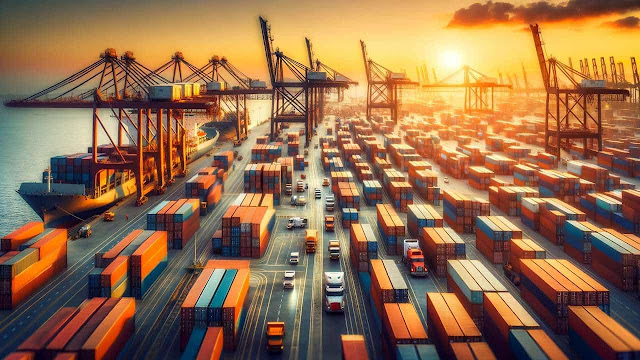The global supply chain is crucial for the economy, connecting producers and consumers. Disruptions can have significant economic impacts, including production challenges, financial issues, and market volatility. To mitigate these, firms are prioritizing robust supply chains, government support, technological advancements, and promoting sustainability and ethical practices.
Introduction
The global
supply chain plays a crucial role in facilitating international trade and
commerce by linking producers and consumers across different continents and
oceans. It facilitates the smooth transportation of goods and services, driving
industries, and satisfying worldwide client needs. Nevertheless, this
interconnected network is susceptible to a multitude of disruptions, including
natural calamities, public health crises, geopolitical conflicts, and trade
conflicts. These disruptions can have substantial effects on worldwide
economies. Gaining insight into these possible vulnerabilities and their consequences
is essential for grasping the intricate dynamics of international commerce.
This blog examines the economic ramifications of interruptions in the global
supply chain, assessing the immediate repercussions on enterprises and consumer
markets, the long-term consequences on various industries and the overall
economy, and the distinct obstacles encountered by different regions and
sectors. The objective is to make a substantial contribution toward a more
resilient and ecologically sustainable future in the realm of international
commerce.
1.
Comprehending the Worldwide Supply Chain
1.1.
The
Foundation of the Contemporary Economy
The global
supply chain is the intricate system that supports the contemporary economy.
The process involves intricate coordination of manufacturing, transportation,
and delivery, including multiple nations and regions. This system facilitates
the efficient transportation of commodities from their point of origin to their
destination, playing a vital role in supporting global trade and economic
development.
1.2.
Susceptibility
to Interruptions
Although the
global supply chain is very efficient, it is susceptible to disturbances. These
can arise from several origins, such as natural calamities, geopolitical
conflicts, or worldwide pandemics. These interruptions can have quick and
extensive ramifications, affecting not only enterprises but entire economies.
Gaining a comprehensive understanding of this susceptibility is crucial for
fully understanding the wider economic consequences of supply chain
disruptions.
2.
Immediate Business Consequences
2.1.
Challenges
in Production and Operations
Supply chain
disruptions can cause substantial operational difficulties for enterprises.
Production delays and shortages of crucial resources are frequently
encountered. This can result in firms being late in order fulfillment,
resulting in financial losses and strained client relationships.
2.2.
Financial
Consequences
Following a supply chain disruption,
there is typically a sudden increase in expenses. Businesses might be required
to procure products from different (and costlier) vendors or pay higher fees
for expedited transportation. These elevated expenses can compress profit
margins and, in certain instances, be transferred to customers through
augmented pricing.
3.
Consumer and Market Dynamics
3.1.
Changes in
Consumer Behavior
Supply chain
interruptions might result in alterations to customer behavior. Product
shortages might lead to panic buying, worsening the issue. Alternatively,
consumers have the option to transition to alternative products, which might
have an impact on firms that are not immediately affected by the interruption.
3.2.
Volatility
in the Market
Disruptions
have the potential to cause substantial volatility in markets. Scarcities can
lead to price increases, whereas an excess supply (once the disturbance is
handled) might result in prices dropping sharply. The unpredictability can pose
difficulties for both businesses and consumers.
4.
Long-Term Economic Impacts
4.1.
Effects on
Global Trade
Over time,
disturbances in the supply chain can have a substantial influence on
international trade. Extended interruptions might diminish the total amount of
commerce, impacting domestic economies and international economic interactions.
4.2.
Shifts in
Employment and Industry
Furthermore,
these disturbances have the potential to cause changes in employment patterns.
Sectors reliant on consistent supply chains, such as manufacturing and retail,
could experience employment reductions. This requires a reassessment of
personnel policies and possible reskilling efforts.
5.
Effects on Specific Regions and Industries
5.1.
Regional
Disparities
The
consequences of supply network disruptions might vary considerably across
different regions. Countries that have well-developed infrastructures are
likely to see a faster recovery, but less developed economies may encounter
more enduring difficulties.
5.2.
Implications
Specific to the Industry
Various
industries encounter these disruptions in unique ways. Industries such as
technology and automotive, which heavily depend on accurate components and raw
materials, may be especially susceptible to substantial operational and
financial difficulties.
6.
Adaptation and Future Strategies
6.1.
Constructing
Robust Supply Chains
Developing the
ability to recover quickly from difficulties or adapt to challenging situations
is crucial for building resilience.
To address these difficulties, firms
are prioritizing the development of more robust supply chains. This entails the
implementation of supplier diversification, the augmentation of inventory
buffers, and the allocation of resources toward technological advancements to
enhance risk management.
6.2.
Government
and Policy Function
Governments
have a vital role in overseeing and minimizing the consequences of supply chain
disruptions. This may entail implementing supportive legislation, allocating
resources to infrastructure development, and promoting international
collaboration to stabilize and enhance global supply networks.
7.
The Way Ahead
7.1.
Advancements
in Technology
Adopting
technology improvements is crucial for developing supply networks that are more
adaptable and robust. Advanced technologies such as artificial intelligence
(AI), blockchain, and the Internet of Things (IoT) can offer
up-to-the-minute information and predictive analysis, enabling businesses to
better anticipate and address possible disruptions.
7.2.
Promoting
Sustainability and Ethical Practices
There is a
growing emphasis on sustainability and ethical practices in supply chain
management. This not only tackles environmental concerns but also conforms to
the changing values of consumers and stakeholders, therefore facilitating the
development of a more sustainable and responsible global economy.
Conclusion
The global supply chain plays a crucial role in our economy, and any
disruptions to it can have substantial economic repercussions. The
interdependence of the global economy underscores the necessity for resilience
and flexibility when confronted with unforeseen challenges. The future
advancement of worldwide supply chains will predominantly rely on bolstering
resilience through variety, embracing technological innovation, and
implementing sustainable practices. These strategies are crucial for mitigating
risks and establishing a more robust framework for international trade.
To establish a strong and ecologically conscious worldwide supply chain,
it is imperative to implement alterations in business supply strategies,
enforce stringent regulatory laws, and promote the widespread adoption of
sustainable and ethical practices. The objective is to create a resilient and
efficient worldwide supply chain that is responsible and flexible in the face
of the ever-changing dynamics of the world.
The intricate worldwide supply chain exemplifies the interdependence of
our planet, presenting prospects for growth, ingenuity, and collaboration.
Through assimilating lessons from disruptions and proactively adapting, we can
construct a more resilient framework for international commerce, guaranteeing a
successful and sustainable future for global economies.



Your comment motivates us